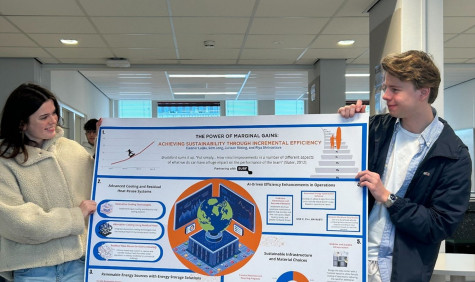SURF collaborates with students on quantum and neuromorphic computing challenges
Tackling the complexity of climate change
As part of SURF's futuring activities, students from the University of Amsterdam recently worked in groups on these two forward-looking challenges, centered around the overarching theme: the complexity of climate change. Their bachelor's program, Computational Social Science, recently won an education award for its collaborative teaching approach. Through this collaboration with SURF, the students engaged with technological challenges of the future.
Process
The student teams worked over a total of 120 hours and followed this process:
- In groups, they combined data from in-depth interviews with stakeholders, existing data, public sources and desk research. Based on this, the students wrote a report with policy-relevant findings. The report was supported by an elaborated infographic.
- Students prepared and presented a presentation of the main findings of their research.
- The student teams worked on climate challenges such as clean water, air pollution, wind energy, etc.
- Challenges from SURF were on quantum versus neuromorphic computing and a sustainable data centre/supercomputer.

Outcomes
The main deliverable for each team was a concrete advisory report, complemented by a custom infographic suitable for sharing. Bachelor’s students Eliana and Esther reflected on what they learned about data centers and quantum/neuromorphic computing: "We need to find ways to cut energy consumption, and we can start with ourselves, the consumers." SURF hopes that collaborations like these will help education and research make better strategic choices for the future and respond more quickly to new developments.
Follow-up
As a follow-up, the Computational Social Science students will present their work, among other things, during SURF's Foresight event on 28 November in Utrecht to further inspire participants.
